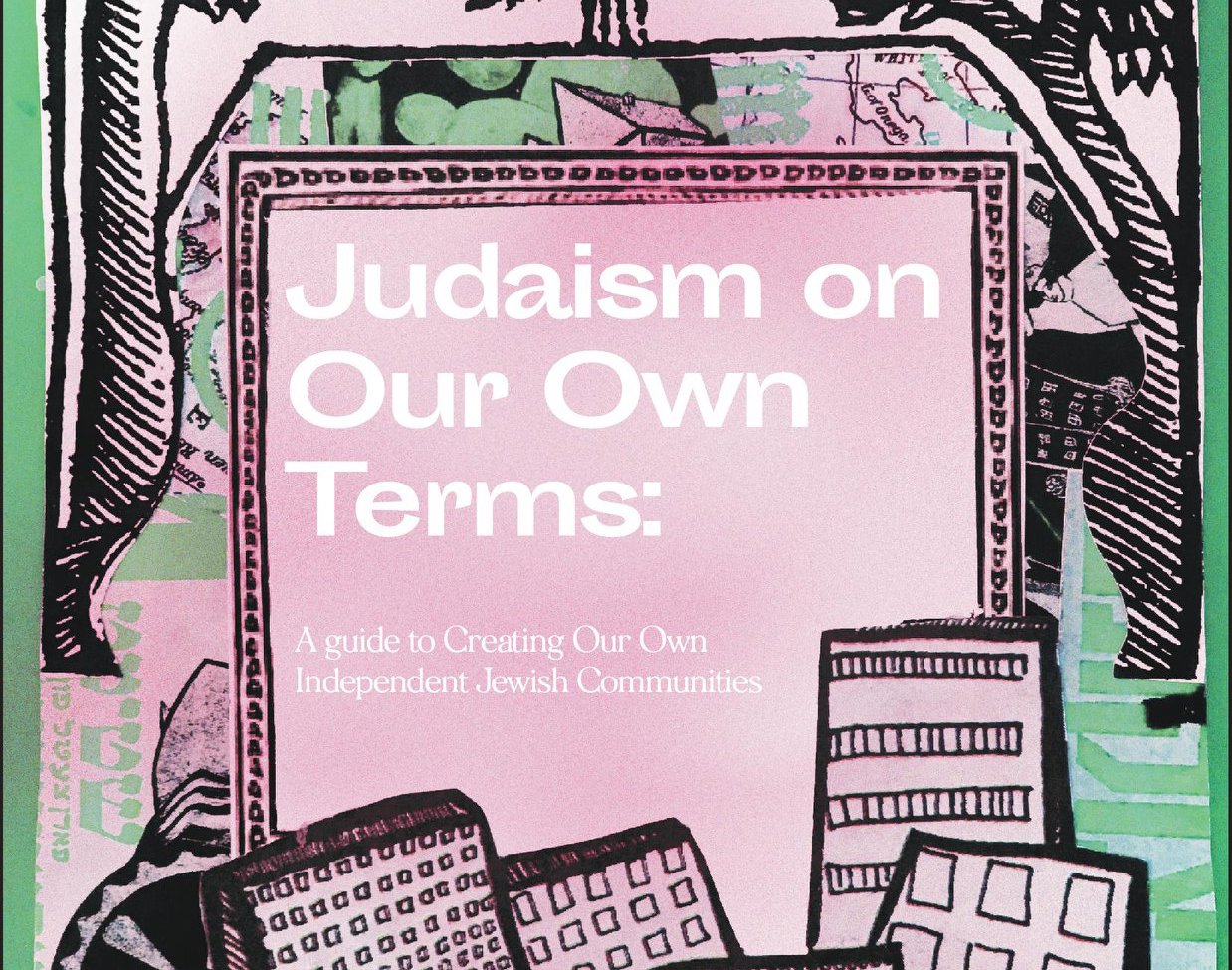This essay was originally published in Jewish Currents.
On any given Sunday night at the Claremont Colleges, between 15 and 20 Jewish students gather to sing wordless melodies, dive into textual study of Talmud or James Baldwin, or hold workshops on antisemitism. The small, independent Jewish group that hosts these gatherings, founded in 2017, is called Nishmat. When a mural at one of the Claremont Colleges honoring the victims of the Tree of Life synagogue massacre was defaced with antisemitic graffiti in December 2018, Nishmat did what few other Jewish groups on campus could: they joined with the Claremont Muslim-Jewish Solidarity Coalition and Students for Justice in Palestine (SJP) to restore the mural and affirm collective solidarity against white supremacy. Though several students affiliated with the campus Hillel also attended, they couldn’t do so in an official capacity, because Hillel International prohibits its chapters and affiliate groups from partnering with groups that support Boycott, Divestment, and Sanctions (BDS), such as SJP. Nishmat, by contrast, puts no such limitations on its members’ political activity or partnership. As co-founder August Kahn told me, Nishmat allows students to show up as their full selves.
Kahn and the other students in Nishmat are affiliated with Judaism On Our Own Terms (JOOOT), a new national network of independent, student-led groups seeking to decentralize campus Jewish life and to build Jewish community without the political limitations and “red lines” that characterize student engagement with campus Hillels. JOOOT, which is an umbrella organization that connects more than a dozen groups across the country, is affiliated with Open Hillel, a national movement formed in 2012 with the stated goal of eliminating “restrictions on discussion and debate” in Jewish institutions. JOOOT organizers have largely found one another through Open Hillel Facebook groups and workshops, and their new network explicitly rejects Hillel International’s standards of partnership, which prohibit Hillel chapters and affiliated student organizations from associating with groups that support the BDS movement.
Open Hillel has grown rapidly since its founding seven years ago, when a group of Jewish students at Harvard University penned an open letter calling for Hillel International to eliminate the standards of partnership after their campus chapter refused to host an event co-sponsored by the Harvard College Palestine Solidarity Committee. Since 2012, Open Hillel has convened several national conferences, held organizing workshops, and formed an academic council of over 100 members. Some demonize the organization as antagonistic and bullying for its advocacy work directly challenging Hillel International’s policy. For example The Forward’s Aiden Pink wrote in a November 2014 Tower magazine essay that Open Hillel, “rather than Hillel International . . . are the ones attempting to forcibly impose a monolithic discourse.”
Though affiliated with Open Hillel, JOOOT offers a slightly different option for those frustrated with the status quo on campus: rather than directly challenge Hillel, build an alternative. To announce their launch this past April, JOOOT released an impressive collection of documents, laying out their goal of “promoting student self-governance and radical inclusivity—both on our individual campuses and in the wider Jewish community,” and providing tools for others to do the same. A five-pronged statement of principles, signed by 14 independent Jewish organizations at Carleton College, University of California-Davis, and Princeton, among others, was posted to Facebook, describing the group’s goals of promoting student leadership over donor interests, rejecting the “silenc[ing]” of campus conversations about Israel and Palestine, and supporting Jewish students “without political litmus tests.” This statement was accompanied by an attractive guidebook for students hoping to start alternative Jewish communities on their campuses, as well as a podcast featuring interviews with student activists about the process of creating independent Jewish groups.
The guidebook—which includes song lyrics and facilitation guides, and poses far more questions than it answers (“Who feels excluded from our community? How do we make our spaces truly inclusive and not just ‘welcoming’?”)—sometimes reads more like a haggadah than a how-to, but it also includes concrete advice for fundraising, coalition building, and maintaining institutional knowledge when members graduate. The independent groups that make up the national network firmly believe that the next phase of Jewish life on campus must be anti-racist and anti-occupation. In a move aimed at avoiding the mistakes made by many of the Jewish institutions in which students have grown up, the guidebook encourages students creating new Jewish organizations to ensure that “JOCSM (Jews of Color, Sephardi, Mizrahi) feel included and comfortable,” to maintain a “[s]upportive network of closed spaces for marginalized people,” and to directly“[a]cknowledge and confront Ashkenormativity.”
But JOOOT’s most radical departure from the mainstream might be their promise to “never jeopardize student needs in the name of donors’ political interests.” Unlike Hillel International, which spent roughly $51.7 million on Jewish programming on its campus centers in 2018, JOOOT groups operate largely without funding, or are scrappily self-fundraised (Open Hillel provides organizational advice and visibility, but not financial support). For example, Brown University’s Friday Night Jews (FNJ), which hosts a weekly potluck Shabbat dinner, relies on students to cook and host the meal. FNJ began as an informal Shabbat dinner gathering in 2016, as a space for Jewish students who were feeling fed up with Hillel’s limitations regarding Israel/Palestine discourse, after the Brown/RISD Hillel rescinded sponsorship of a film screening by the Israeli nonprofit Zochrot, an organization that educates Jewish Israelis about the Nakba. Hal Triedman, who helped plan JOOOT’s inaugural conference and who was an FNJ participant early on, explained to me the thinking behind organizing the group: “We said, let’s make Shabbat dinner and talk about the stuff we can’t talk about at Hillel.”
Hillel International’s website plainly states that “Israel is at the heart of Hillel’s work.” Its standards of partnership limit which speakers and organizations campus chapters may associate or co-host events with—excluding not only groups that support BDS, but also those that identify as anti-Zionist or “exhibit a pattern of disruptive behavior.” Critics feel that language barring “disruptive” student groups on campus in order to “foster an atmosphere of civility” is overly broad and reveals an aversion to working with student activist groups and organizers. Both JOOOT and Open Hillel argue that Hillel International limits discussion and collaboration to fairly right-wing, pro-Israel individuals and groups. Very few Palestinian student groups—or Palestinian people, for that matter—meet Hillel’s standards to co-host an event or to appear as a speaker; even Jewish groups like Jewish Voice for Peace (JVP) are disallowed due to their support for BDS. For a long time, if they wanted to find any difference of opinion on the issue of Israel/Palestine, Jewish students have had to exit Jewish spaces like Hillel.
By contrast, JOOOT’s guidebook offers a template for Jewish communities to engage in conversations about the Israeli–Palestinian conflict across political difference. And though they’re explicit about organizing around a certain politic, they are serious about maintaining a welcoming stance and leaving room for dialogue. One section explicitly acknowledges and interrogates this tension: “How can the group be socially inclusive while maintaining an identity as an alternative space for those pushed out of other Jewish spaces, especially around Zionism? It’s also important to leave space for people to grow, explore, and potentially expand their political identities.”
JOOOT’s rapid growth from its first Shabbaton conference in August 2018 to a more robust network with growing affiliate chapters suggests an uneasy future for Hillel International. Hillel, which currently has chapters at over 550 college campuses in the US and 56 campuses abroad, is under increasing pressure from students to cut ties with right-wing mega-donors, such as Sheldon Adelson, and with pro-Israel groups that are prone to doxxing and harrassing students, such as the Israel on Campus Coalition and Canary Mission. This Passover, IfNotNow chapters staged sit-ins at the University of Chicago, University of Michigan, and Northeastern University Hillels as a part of their campaign calling on Hillel to cut ties with Birthright, which the group says hides the reality of Israeli occupation. In recent years, Hillel chapters have also come under fire for withdrawing support from or further marginalizing queer Jewish student groups that participate in events co-sponsored by JVP, and for banning legendary civil rights activist Dorothy Zellner from speaking at campus chapters after she discussed her commitment to Palestinian human rights work in a speech at Harvard’s Hillel. (When, in defiance of this ruling, Swarthmore Hillel invited Zellner and other civil rights veterans to speak several months later, Hillel International threatened legal action, prompting the campus’s conversion into an “Open Hillel.”)
But JOOOT organizers say the standards of partnership aren’t the only factor pushing Jewish students away from Hillel. Nat El-Hai, of the JOOOT-affiliated Occidental Jewish Student Union, says that their campus group “attract[s] a lot of patrilineal Jews, [or] Jews who weren’t necessarily raised in Judaism. We are creating a space for people who do not necessarily fit into these prominent narratives at Hillel about what being Jewish means.” Naomi Weintraub, co-founder of Jews Givin’ a Fuck (JGAF) at Clark University, said that the goal of leaving major Jewish institutions is not to replicate old structures under new names. “If this is our dream Jewish alternative community, we should be in solidarity with all marginalized groups, we should be truly accessible to all, and we must think about being sustainable,” they told me. Kahn sees both Nishmat and JOOOT as connected to the history of outsider Jewish practice, citing the queer yeshiva Svara and the long history of informal, independent havurahs. “These crunchy outside things are our siblings,” Kahn told me, “and we are indebted to them in building these Jewish communities.”
Yet the distinction between JOOOT-affiliated groups and campus Hillels is often blurry. Triedman says that at Brown, there is “significant overlap in the leadership of Hillel and the people who are involved in FNJ.” Similarly, Kahn says that “there are folks who go to both [Hillel and Nishmat], looking for different things.” Zachariah Sippy, of the JOOOT-affiliated Alliance of Jewish Progressives (AJP) at Princeton, says he attends the conservative minyan at Princeton’s Hillel (called the Center for Jewish Life, or CJL) each week. “Almost all of us [in AJP] are very active in the Jewish community and that’s something that we take immense pride in,” Sippy says. “[Hillel] can’t look us in the eye and say ‘you’re not a part of the Jewish community’ because we are their constituents.”
Still, like Open Hillel, JOOOT groups often clash with local Hillel chapters. In April, Princeton’s AJP called for the cancellation of an “Israel Shabbat,” hosted by the advocacy group Tigers for Israel in the CJL building, on the grounds that the event deliberately ignored Palestinian oppression. “They tried to say that it wasn’t political,” Sippy says, “but presenting a certain narrative of Israel that does not talk about the occupation is a political choice.” Sippy and the AJP gathered over 200 signatures on their petition to cancel the event and held a “Not Our Shabbat” the same Friday evening. In response, the CJL student board president wrote a letter to The Daily Princetonian calling AJP’s actions “reprehensible.” “I was really pained,” Zachariah told me. “The week of the Israel Shabbat I didn’t daven at CJL for the first time since being on campus.”
Though JOOOT-affiliated independent groups lack the financial resources and name recognition of Hillel International, they offer students a powerful invitation: create the Judaism you want to be a part of. Kahn believes that JOOOT’s impact will extend far beyond the campus. “We’re giving people a taste of what the potential of radically inclusive Judaism can be,” he says. “In college, we can build a new face of Jewish practice.”
Editor’s Note: The author was recently a member of Northwestern University’s Jewish Progressive Alliance, which signed JOOOT’s statement of principles.
Jess Schwalb is the Jewish Currents 2019-2020 New Voices fellow.

